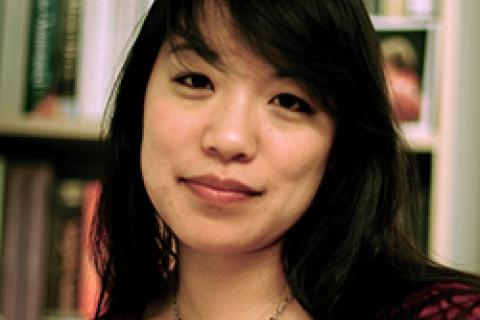Colloquium Speaker: Elaine Auyoung
Elaine Auyoung (pronounced O-Young) is an associate professor of English and an affiliated faculty member of Gender, Women & Sexuality Studies and the Center for Cognitive Sciences. Her multidisciplinary interests include nineteenth-century British literature and culture, the experience of reading, psychological approaches to the arts, feminist epistemology, and learning in the humanities. Her scholarship seeks to recover forms of knowledge and experience that disciplinary norms and institutional structures systematically exclude or discount.
She is the author of When Fiction Feels Real: Representation and the Reading Mind, which draws on psychological research on reading and cognition to explore the relationship between novelistic technique and literary experience. This book accounts for how writers such as Jane Austen and Leo Tolstoy bring readers into intimate relation with fictional characters and worlds by engaging their embodied knowledge and their readiness to form social impressions. In chapters on Charles Dickens, George Eliot, and Thomas Hardy, Auyoung argues that realist aesthetics is also distinguished by readers’ mediated, one-sided relation to objects, experiences, and characters that are never within reach.
Professor Auyoung is currently working on two book projects:
“Becoming Sensitive” engages perspectives from education and perceptual learning to specify how literature and literary study transform our perception, preparing us to notice features of texts and experiences with greater nuance and precision. By calling attention to aspects of literary critical expertise that tend to be left tacit and to the blind spots that come with expertise in any domain, this project works toward a more explicit and inclusive approach to the teaching of literature. It also makes a fresh case for the value of “knowing with” the arts and humanities, a form of knowledge that has long been obscured by traditional approaches to educational assessment.
“Unselfing: What We Can Ask of the Arts" explores how fiction, poetry, visual art, music, and dance create uniquely powerful but fragile experiences of connection, belonging, even transcendence. It traces how the distinctive social and situational contexts in which we encounter the arts, and which artists and performers work to create, enable audiences to experience temporary forms of intimacy and solidarity unavailable in everyday life. By attending to how situational and relational contexts mediate our aesthetic emotions, “Unselfing” identifies a vital new role for aesthetic education in the twenty-first century: cultivating critical awareness of how we might continue to feel, judge, and act on behalf of others even in the absence of conditions that facilitate empathy and self-forgetfulness.
